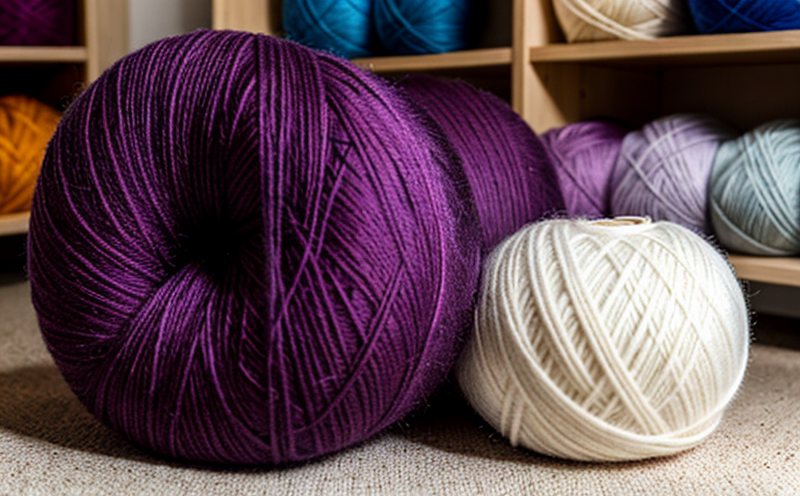BS 1932 Testing of Yarn Strength and Elongation
The British Standard (BS) 1932 method is a recognized industry standard used to evaluate yarn strength and elongation, which are critical properties in ensuring the quality and performance of textile products. This test is particularly important for manufacturers and suppliers who need to comply with regulatory standards or ensure product consistency.
Yarn strength refers to its resistance to breaking under tension, while elongation measures how much a yarn can stretch before it breaks. These two parameters are essential in determining the durability, comfort, and overall performance of textile products. The BS 1932 test is widely used in sectors such as apparel, home textiles, automotive upholstery, and industrial fabrics.
The test involves subjecting yarn samples to a defined tension until they break. The load at which the yarn breaks (in Newtons) is measured as strength, while the elongation is determined by the percentage of stretch before failure. These parameters are reported in standardized units, such as N/mm and %.
Proper specimen preparation is crucial for accurate test results. Samples must be cut to a specific length and diameter, ensuring they represent the yarn's actual properties. The testing equipment used should comply with the standards specified in BS 1932, which includes a tensile tester capable of applying controlled loads.
The test setup involves attaching the yarn sample to the grips of the tensile tester, then gradually increasing the load until the yarn breaks. The force and elongation are recorded throughout the process. The results provide valuable insights into the yarn's quality and can help identify potential issues in production processes or raw material selection.
The BS 1932 method is also used for quality control purposes to ensure consistency across batches of yarn. By regularly testing yarn samples, manufacturers can monitor changes in yarn quality and make necessary adjustments to their manufacturing processes. This helps maintain product performance standards and ensures customer satisfaction.
Textile companies that use this test as part of their quality assurance process benefit from improved product reliability and a competitive edge in the market. Accurate and consistent testing results allow for better decision-making regarding raw material selection, production adjustments, and product development.
The BS 1932 method is just one of several tests used to evaluate yarn properties. It complements other tests such as dye fastness, abrasion resistance, and shrinkage rate tests, providing a comprehensive understanding of the yarn's performance characteristics.
| Applied Standards | Description |
|---|---|
| BS 1932: Part I - Determination of tensile strength and elongation at break of staple fibres, tow, roving, yarns and similar products | This standard specifies the procedure for determining the tensile strength and elongation at break of staple fibres, tow, roving, yarns, and similar textile products. It ensures consistent testing across different types of materials. |
| ISO 13934-2: Yarn - Determination of tensile properties - Part 2: Single-filament yarns | This international standard provides a method for determining the tensile properties of single-filament yarns, which can be used as a reference or supplement to BS 1932. |
The combination of these standards ensures that yarn testing is comprehensive and reliable, providing accurate data for quality assurance purposes.
Applied Standards
| Standard Name | Description |
|---|---|
| BS 1932: Part I - Determination of tensile strength and elongation at break of staple fibres, tow, roving, yarns and similar products | This standard specifies the procedure for determining the tensile strength and elongation at break of staple fibres, tow, roving, yarns and similar textile products. |
| ISO 13934-2: Yarn - Determination of tensile properties - Part 2: Single-filament yarns | This international standard provides a method for determining the tensile properties of single-filament yarns, which can be used as a reference or supplement to BS 1932. |
The use of these standards ensures consistent and accurate testing results, which are essential for quality assurance in textile manufacturing. Compliance with these standards is crucial for manufacturers aiming to meet regulatory requirements and maintain product quality.
Eurolab Advantages
At Eurolab, we offer comprehensive yarn strength and elongation testing services that adhere strictly to BS 1932. Our state-of-the-art facilities are equipped with the latest testing equipment, ensuring precise and reliable results.
- Accurate specimen preparation according to industry standards
- Precision tensile testers calibrated to meet international standards
- Detailed reporting and data analysis for comprehensive test outcomes
- Experienced technicians trained in conducting BS 1932 tests
- Compliance with ISO, EN, ASTM, IEC, and other relevant standards
- Rapid turnaround times to meet project deadlines
- Confidentiality and data security for our clients' information
We pride ourselves on delivering consistent results that are trusted by industry leaders. Our services are designed to help you make informed decisions about your yarn quality, ensuring product performance meets or exceeds customer expectations.
Quality and Reliability Assurance
- Regular calibration of testing equipment to ensure precision and accuracy
- Detailed documentation of test procedures and results for traceability
- Use of advanced software for data analysis and reporting
- Ongoing training for our technicians to stay updated on the latest testing methods
- Compliance with international standards and regulations
- Participation in inter-laboratory comparisons to validate test results
- Dedicated support team available 24/7 for technical assistance and consultation
We are committed to providing services that meet the highest quality assurance standards. Our approach ensures that every test conducted is accurate, reliable, and meets your specific requirements.





